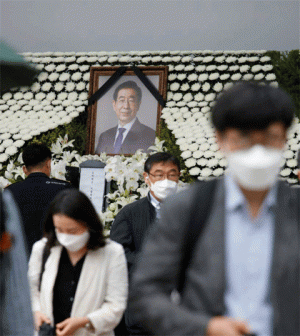- Finding Unshakable Power in a World That Wants to Pull Us ApartPosted 5 months ago
- What could a Donald Trump presidency mean for abortion rights?Posted 5 months ago
- Financial Empowerment: The Game-Changer for Women in Relationships and BeyondPosted 6 months ago
- Mental Health and Wellbeing Tips During and After PregnancyPosted 6 months ago
- Fall Renewal: Step outside your Comfort Zone & Experience Vibrant ChangePosted 6 months ago
- Women Entrepreneurs Need Support SystemsPosted 7 months ago
Seoul mayor's death renews #MeToo debate in South Korea

By Beh Lih Yi | @BehLihYi | Thomson Reuters Foundation
Case has cast a fresh spotlight on hurdles of sexual harassment victims seeking justice despite growing feminism movement
KUALA LUMPUR, July 15 – As South Koreans mourn the death of a popular mayor, his complex legacy has cast a fresh spotlight on hurdles faced by sexual harassment victims seeking justice, even as the country’s feminist movement gains momentum.
Park Won-soon, the longtime mayor of the capital Seoul who had championed women’s rights, was found dead on Friday, days after one of his former secretaries filed a complaint alleging he had sexually harassed her.
Feminist campaigners have said the case, which follows similar abuse allegations involving powerful figures, highlights deeply entrenched sexism in the socially conservative nation.
But rather than bring closure for the accuser, Park’s death will lessen her chances of winning justice, and further highlights how difficult it is for women to successfully challenge men in positions of power, they say.
“He didn’t just kill himself. He extinguished any chance for the victim to seek justice,” said Ju Hui Judy Han, a gender studies expert at the University of California who grew up in Seoul.
“It is simply not true that #MeToo voices are strong enough to bring down perpetrators of sexual violence in positions of power,” she told the Thomson Reuters Foundation.
Abusers are “rarely” brought to justice and when they are, they are given lenient sentences, said Han, citing the case of a former provincial governor jailed in 2019 for molesting an aide.
Park, 64, left a note apologising to “everyone”. Police did not give a cause of death, but said there was no sign of foul play, while a representative of his family warned of action against those who spread “groundless statements”.
The Gender Equality and Family Ministry did not respond to a request for comment.
On Wednesday, the Seoul metropolitan government said a committee to include women’s rights and legal experts would investigate the sexual misconduct allegations.
“(The city) will guarantee the fairness and objectivity of the probe,” spokesman Hwang In-sik said, according to South Korea’s Yonhap news agency.
‘SECOND CLASS’
Park’s death came after several other high-profile cases.
The mayor of Busan, South Korea’s second-largest city, stepped down in April after acknowledging unnecessary physical contact with a female staffer. In June, a Korean triathlete was found dead after alleging she had been abused by her coach.
This month a South Korean court refused a U.S. extradition request for a man who had completed an 18-month jail sentence for running a global dark web child pornography site.
South Korean women are increasingly vocal and speak out against sexism, with tens of thousands taking to the streets in recent years to protest over the proliferation of hidden cameras targeting women.
The government has taken action to crack down the crime and vowed to improve gender equality in society, but feminist groups say recent cases show there is still a long way to go.
“Korean women are still treated like second-class citizens,” said Kwon Soo-Huyn, president of the Korea Women’s Political Solidarity, a campaign group.
“The fact that the victims have to risk their entire life to find justice shows how low the level of gender equality is in South Korea and how tough it is to get justice,” she added.
Park, who was seen as a potential presidential candidate, was known for his advocacy work for women’s rights and his death has ignited intense debate.
As a lawyer in the 1990s, he won one of South Korea’s earliest cases on sexual harassment, and had praised women for their courage after accusations were levelled against powerful figures for sexual wrongdoing amid the #MeToo movement.
At a press conference on Monday, just hours after the mayor’s funeral, Park’s accuser – whose identity has not been disclosed – expressed her desire for fairness and equality.
“I dream of a world where I can live as a human being,” she said in a letter released through her lawyer.
Related stories:
Mayor of S.Korea’s capital found dead amid impropriety allegation
Me and my (porn) shadow: ‘spycam’ epidemic seizes S.Korea
No sex, no babies: S.Korea’s emerging feminists reject marriage
(Reporting by Beh Lih Yi @behlihyi; Editing by Claire Cozens. Please credit the Thomson Reuters Foundation, the charitable arm of Thomson Reuters, that covers the lives of people around the world who struggle to live freely or fairly. Visit http://news.trust.org)
Our Standards: The Thomson Reuters Trust Principles.






